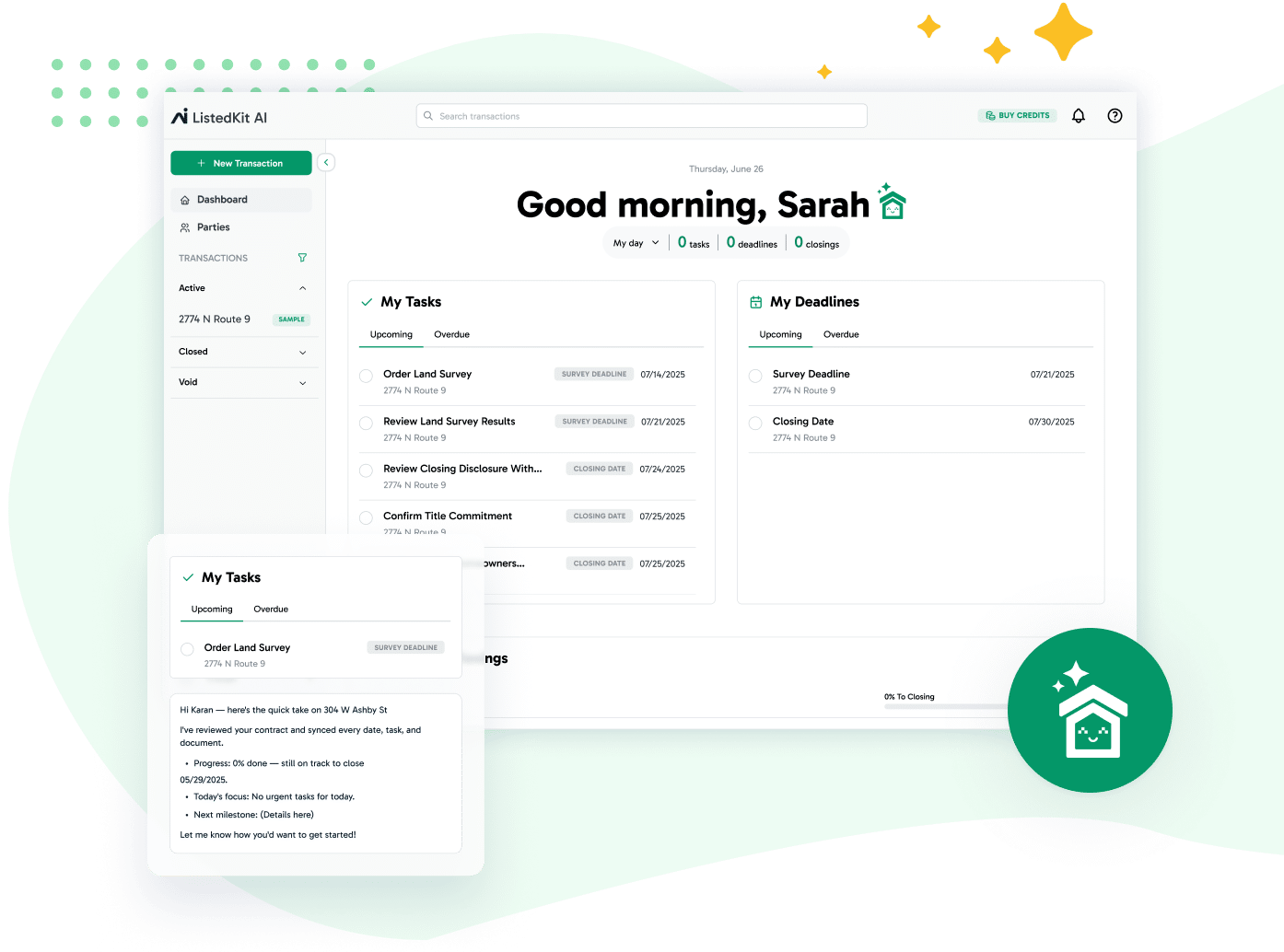The emerging trends in real estate in 2025 aren’t just happening on the agent side. They’re shaping how you, as a transaction coordinator, work daily.
From task automation to software consolidation, what used to be “nice to have” is quickly turning into baseline expectations. And if you’ve ever felt like the pace of change keeps speeding up without warning, you’re not alone.
This article outlines what’s shifting and how you can adjust your transaction coordination systems to keep up. No fluff. Just relevant developments that could impact how you work in 2025.
1. AI Isn’t Replacing You—It’s Refining Your Workflow
Let’s be honest—AI can feel like a threat until you’ve seen what it actually does for a real estate transaction coordinator.
Rather than replacing your skills, AI supports them. It takes repetitive administrative tasks—like scanning contracts or formatting updates—and handles them in the background so you can focus on decisions that move the file forward.
How AI Helps TCs
Here’s how you can take advantage of AI right now:
- Smart document review. Instead of line-by-line scanning, AI pinpoints errors or missing items across contracts, disclosures, or amendments. This is especially helpful when managing many real estate transactions at once.
- Auto-generated checklists. Some AI tools generate suggested timelines based on contract type or region with task priority built in. You still review—but the base work is done.
- Client-facing communication. AI can now draft routine updates for agents or real estate clients based on the latest file status, saving you hours of back-and-forth messaging.
For real estate businesses with high transaction volumes, this means more predictable progress without added pressure on your day.
Useful Platforms for Real Estate TCs that Use AI
Looking ahead, AI is being deeply integrated into platforms like Google Workspace.
Tools like Gmail, Docs, and Sheets now include built-in AI support for writing, formatting, organizing, and analyzing. For real estate coordinators, that means faster email drafts, smarter scheduling suggestions, and contextual summaries that save hours across your week.
Let AI Handle Your Contract Details
—So You Don’t Have To
Pull key details from your documents and build your checklist automatically with ListedKit AI.
2. Regional Regulation Shifts Are Making Compliance a Moving Target
A new regulation hits every few months, and it often lands directly on your task list.
Staying compliant is no longer about knowing the rules. It’s about adapting fast when those rules shift.
Whether you’re an in-house TC or a virtual transaction coordinator working across state lines, regulations are evolving—and missing one line of text can cause delays or disputes.
Examples of shifting policies:
- Commission transparency. Following a 2024 settlement, listing agents can no longer offer buyer-agent commissions on the MLS. Buyers need written agreements with their agents, and compensation is negotiated separately. While early predictions suggested major changes, most commissions have stayed relatively steady—though the process has become more complex for agents and clients.
- Energy standards. Local mandates like New York’s Local Law 97 require large buildings—those over 25,000 square feet—to meet new carbon emissions limits starting in 2025. Buildings that exceed those limits may face annual fines, prompting many owners to pursue energy-efficient upgrades. These upgrades can affect timelines, costs, and disclosures during the transaction process.
- Landlord protection and tenant laws. Cities are beginning to implement Good Cause Eviction clauses, which impact rental agreements and the scope of disclosures needed.
As a skilled transaction coordinator, you’re often expected to track these updates without being directly told.
Consider keeping a “living library” of regulation snapshots by region. This is especially valuable if you support real estate agents or real estate business owners who work across multiple states or metro areas.
3. Buyers Are Hesitating—TCs Need Smoother Pipelines Than Ever
The current real estate market is uneven. Mortgage rates are still elevated, home prices are rising in most regions, and affordability remains out of reach for many first-time buyers. As a result, some are holding off, and others are revising their financing mid-deal.
What does that mean for you? You’re managing more half-started files, longer negotiations, and slower timelines while trying to protect your calendar.
Let’s break it down:
- Delayed earnest money submissions. With buyers hesitating, tasks like earnest money deposits or property inspections often get pushed, which clutters your checklist and affects compliance.
- More time between steps. A client might need an extra week to finalize pre-approvals or request concessions, so your reminders and agent updates must stay flexible.
- Revised timelines. Price adjustments, new financing terms, and addenda are appearing more often, especially as rates stay above 6.5%.
Here’s where having flexible systems matters. ListedKit lets you shift key deadlines without disrupting your entire checklist. When a date moves, dependent tasks move, too, saving you from redoing timelines manually across different tools.
When you’re supporting multiple real estate professionals at once, this adaptability helps you keep deals moving without feeling like you’re rebuilding the process each time.
As economic pressure and rate fluctuations continue to influence buying behavior, staying steady as a transaction coordinator makes you an anchor for your agents and their clients.
4. Expect Broader Software Consolidation
More real estate coordinators are reaching the same conclusion: fewer tools and deeper utility. Instead of stitching together five platforms, they’re seeking one or two that cover everything from scheduling inspections to sharing final disclosures.
In 2025, this consolidation trend will only accelerate.
What to prioritize:
- Task management + document storage. Look for systems that handle both. If you upload PDFs into one tool, then tracking them in another, you’re wasting time.
- Client visibility. Some real estate agents want status updates without emailing you. A dashboard or portal view solves that.
- Integration with Google Workspace. Real estate professionals rely heavily on Gmail, Google Calendar, and Drive, which your system should sync with.
One platform worth considering is ListedKit. It combines scheduling, task kits, and communications, cutting down your tab count and giving you clearer oversight in real-time.
The more intuitive your software setup, the easier it will be to scale your workload—whether you’re growing your business or just managing more files efficiently.
When evaluating tools, think beyond price. Factor in support, updates, mobile functionality, and the time it saves on administrative tasks.
5. Niche Knowledge Will Set You Apart
The days of “here’s your checklist, good luck” are fading. More agents now see TCs as an extension of their team—not just someone to process paperwork.
That’s why building your knowledge base is one of the best things you can do in 2025.
Where to start:
- Understand transaction patterns. Real estate teams want you to notice when deals stall, when inspectors are booked out, or when insurance coverage limitations pop up.
- Track trends in your region. Maybe solar disclosures are standard in your city, or lenders ask for new verification forms. The more you know, the better you support your agent or real estate clients.
- Stay sharp on compliance. This includes license renewal requirements, agency agreements, and new paperwork for investor clients.
Real estate business owners and agents now expect transaction coordinators to serve as consultants. And the better your insights, the stronger those client relationships become.
Look to growth experts in your area, check training resources or online licenses for education, or join real estate conference schedules that offer short virtual sessions.
6. Green Deals Are No Longer a Niche
Green transactions aren’t fringe anymore—they’re becoming a practical part of the real estate business.
Here’s how sustainability is now showing up in transactions:
- Eco certifications are influencing appraisals, marketing, and even buyer interest. You may be asked to coordinate with third-party verifiers or manage new documents as a TC.
- Younger buyers and eco-conscious agents are requesting paperless systems. If you’re still scanning signed documents, it’s time to upgrade.
- Vendor expectations are shifting. More clients ask if your preferred inspector, stager, or cleaner follows eco-safe practices.
Support Eco-Friendly Transaction as a TC
As real estate sectors expand their sustainability efforts, you can support the transition while improving your workflow. Going digital reduces storage and operational costs and makes compliance easier during audits.
And let’s be honest—eco-aligned practices make you more appealing to certain client segments.
Consider building a “green kit” inside your task manager. It should include preferred vendors, form templates, and optional add-ons like solar inspection scheduling.
Real estate business growth is tied to adaptability. TCs who move with the market—not against it—will lead the way.
How to Stay Ready for What’s Next in 2025
You don’t have to predict every change in the real estate industry. You just need a system that helps you adjust when it happens. The trends shaping 2025 aren’t about doing more; they’re about working with more clarity, fewer delays, and better tools.
Here’s what’s shifting—and how you can respond:
- Use AI to simplify the heavy lifting. Automate checklist creation, document review, and client updates so you can spend more time managing progress—not paperwork.
- Adapt to ongoing regulation changes. Stay current on commission rules and building laws like LL97 by tracking them regionally and updating your workflows.
- Build pipelines that handle buyer delays. Prepare for paused earnest money, rate-sensitive changes, and mid-deal adjustments with systems that flex—not break.
- Rely on fewer, smarter tools. Choose platforms that combine your checklists, calendars, and communications—so you’re not managing the tools as much as the transaction.
- Sharpen your knowledge to stay valuable. Watch for regional trends, shifting lender requirements, and emerging standards. These insights make you a go-to resource.
- Make sustainability part of your workflow. Go paperless where you can, add green-friendly vendors, and show agents you’re aligned with clients’ requests.

Update how you work without giving up control
See how ListedKit can automate your system and help you focus on what you do best.




